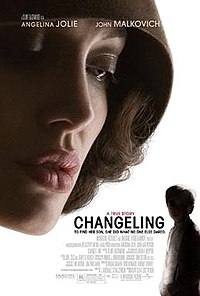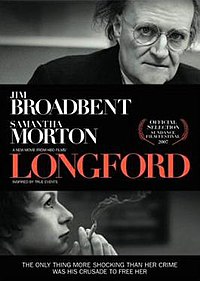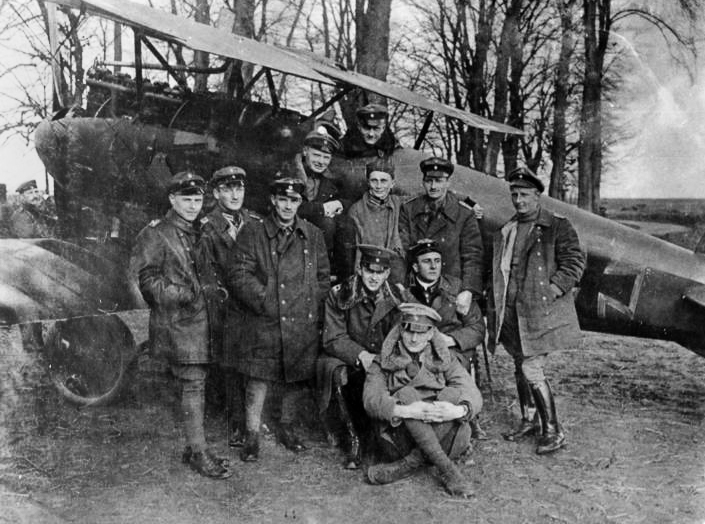
Directed by Clint Eastwood
Written by J. Michael Straczynski
Starring: Angelina Jolie, Jason Butler Harner, Jeffrey Donovan, John Malkovich, Michael Kelly, Amy Ryan, Geoff Pierson, Gattlin Griffith, Colm Feore, Denis O’Hare, Devon Conti
Release Year: 2008
IMDB rating: 8.1
Another film based on a true story about Wineville Chicken Coop Murders committed in California in 1928 but, unlike Longford, the audience was dragged to sympathize with the victims. In this case, I wonder if Lord Longford would want to campaign for a release of Gordon Northcott the way he campaigned for Myra Hindley.
The victims of the murders were young boys. Although Gordon Northcott was convicted for 3 murders, it was believed that the number of the victims could have reached as many as 20. During the murders, he was ‘assisted’ by his nephew, Sandford Clark.
 The film began with the disappearance of Walter Collins, the son of Christine Collins on March 10th 1928. Unsuccessful to find the missing boy, the Los Angeles Police Department were under heavy pressure from the public. In the movie, the public were represented by Reverend Gustav Briegleb who already critizing the LAPD for its incompetence, corruption, and excessive violence outside the justice system. Several months passed and one day the police informed Christine that Walter had been found. However, upon meeting the boy, she believed that the boy was not Walter but was told to just take him home. After a while, she found out physical differences between Walter and the boy: that Walter was taller and not circumcised. When she brought the matter to the police, the LAPD insisted, through Captain J.J. Jones that the boy was indeed Walter. Eventually, her persistence made Captain Jones to put her into a mental institution. This implied that the LAPD could not afford the public humiliation of being mistaken. Meanwhile, Detective Ybarra was assigned to deport a boy who happened to be Sandford Clark. It was from Clark that the Collins’ case eventually solved.
The film began with the disappearance of Walter Collins, the son of Christine Collins on March 10th 1928. Unsuccessful to find the missing boy, the Los Angeles Police Department were under heavy pressure from the public. In the movie, the public were represented by Reverend Gustav Briegleb who already critizing the LAPD for its incompetence, corruption, and excessive violence outside the justice system. Several months passed and one day the police informed Christine that Walter had been found. However, upon meeting the boy, she believed that the boy was not Walter but was told to just take him home. After a while, she found out physical differences between Walter and the boy: that Walter was taller and not circumcised. When she brought the matter to the police, the LAPD insisted, through Captain J.J. Jones that the boy was indeed Walter. Eventually, her persistence made Captain Jones to put her into a mental institution. This implied that the LAPD could not afford the public humiliation of being mistaken. Meanwhile, Detective Ybarra was assigned to deport a boy who happened to be Sandford Clark. It was from Clark that the Collins’ case eventually solved.

In a matter of acting performances, I believe that Angelina Jolie, Jason Butler Harner and Jeffrey Donovan deserved the applause, as well as Geoff Pierson who portrayed Sammy Hahn, the defense attorney who represented Christine Collins. While Jolie managed to play the character of a woman who was deemed ‘second class’ during that period, struggling to fight for finding the truth regarding her son, Harner gave me the impression of a serial killer with no sense of guilt. Shown relaxed and somewhat mentally disturbed, he finally trembled in fear when facing death itself. Jeffrey Donovan also successful in delivering the image of the authority that would do anything to avoid public humiliation. Scenes during the trial when Sammy Hahn questioned Captain Jones were very good, although it was rather short. John Malkovich could have been impressive if only his character performed more dialogues, but given that his role was rather small, his fine performance was overshadowed by the ones I’ve mentioned earlier.
I think the story was well told, and that the suspense factor was kept going throughout the film. Focusing on not just the murder, but the themes of that era such as violence by the police and the suppression of women. For those unaware of the conditions of that period, especially regarding the latter, it should come to mind halfway through the film when Christine was admitted to the mental institution. Despite the plot put the image of the authorities on the negative side, it was after all, managed to balance it through Detective Ybarra and that in the end, the system worked. From Eastwood himself, he said that Gordon Northcott was an ideal candidate for a capital punishment of crimes against children although public display of the execution should be considered as barbaric (as seen near the end of the movie).
Overall, watching the movie was a great experience to me. Especially after finished watching Longford which had the same theme, but of different perspective. While Longford promotes forgiveness, Changeling condemns the crime. Looking at Gordon Northcott’s case, one would most likely refuse to provide forgiveness to the man. Yet, there is one significant difference here: Northcott only served 2 years in prison before he was hanged to death, while Myra Hindley served more than 30 years before she died. One question arises: had Gordon be sentenced to life imprisonment, would he able to redeem his crimes? Unfortunately, no one would be able to answer that. This movie also acts as a reminder on how things were when women were treated as second-class citizens. Even now, in some countries, this still happens.
As for the final score for the movie, I give it an 8.0.
Starring: Angelina Jolie, Jason Butler Harner, Jeffrey Donovan, John Malkovich, Michael Kelly, Amy Ryan, Geoff Pierson, Gattlin Griffith, Colm Feore, Denis O’Hare, Devon Conti
Release Year: 2008
IMDB rating: 8.1
Another film based on a true story about Wineville Chicken Coop Murders committed in California in 1928 but, unlike Longford, the audience was dragged to sympathize with the victims. In this case, I wonder if Lord Longford would want to campaign for a release of Gordon Northcott the way he campaigned for Myra Hindley.
The victims of the murders were young boys. Although Gordon Northcott was convicted for 3 murders, it was believed that the number of the victims could have reached as many as 20. During the murders, he was ‘assisted’ by his nephew, Sandford Clark.
 The film began with the disappearance of Walter Collins, the son of Christine Collins on March 10th 1928. Unsuccessful to find the missing boy, the Los Angeles Police Department were under heavy pressure from the public. In the movie, the public were represented by Reverend Gustav Briegleb who already critizing the LAPD for its incompetence, corruption, and excessive violence outside the justice system. Several months passed and one day the police informed Christine that Walter had been found. However, upon meeting the boy, she believed that the boy was not Walter but was told to just take him home. After a while, she found out physical differences between Walter and the boy: that Walter was taller and not circumcised. When she brought the matter to the police, the LAPD insisted, through Captain J.J. Jones that the boy was indeed Walter. Eventually, her persistence made Captain Jones to put her into a mental institution. This implied that the LAPD could not afford the public humiliation of being mistaken. Meanwhile, Detective Ybarra was assigned to deport a boy who happened to be Sandford Clark. It was from Clark that the Collins’ case eventually solved.
The film began with the disappearance of Walter Collins, the son of Christine Collins on March 10th 1928. Unsuccessful to find the missing boy, the Los Angeles Police Department were under heavy pressure from the public. In the movie, the public were represented by Reverend Gustav Briegleb who already critizing the LAPD for its incompetence, corruption, and excessive violence outside the justice system. Several months passed and one day the police informed Christine that Walter had been found. However, upon meeting the boy, she believed that the boy was not Walter but was told to just take him home. After a while, she found out physical differences between Walter and the boy: that Walter was taller and not circumcised. When she brought the matter to the police, the LAPD insisted, through Captain J.J. Jones that the boy was indeed Walter. Eventually, her persistence made Captain Jones to put her into a mental institution. This implied that the LAPD could not afford the public humiliation of being mistaken. Meanwhile, Detective Ybarra was assigned to deport a boy who happened to be Sandford Clark. It was from Clark that the Collins’ case eventually solved.
In a matter of acting performances, I believe that Angelina Jolie, Jason Butler Harner and Jeffrey Donovan deserved the applause, as well as Geoff Pierson who portrayed Sammy Hahn, the defense attorney who represented Christine Collins. While Jolie managed to play the character of a woman who was deemed ‘second class’ during that period, struggling to fight for finding the truth regarding her son, Harner gave me the impression of a serial killer with no sense of guilt. Shown relaxed and somewhat mentally disturbed, he finally trembled in fear when facing death itself. Jeffrey Donovan also successful in delivering the image of the authority that would do anything to avoid public humiliation. Scenes during the trial when Sammy Hahn questioned Captain Jones were very good, although it was rather short. John Malkovich could have been impressive if only his character performed more dialogues, but given that his role was rather small, his fine performance was overshadowed by the ones I’ve mentioned earlier.
I think the story was well told, and that the suspense factor was kept going throughout the film. Focusing on not just the murder, but the themes of that era such as violence by the police and the suppression of women. For those unaware of the conditions of that period, especially regarding the latter, it should come to mind halfway through the film when Christine was admitted to the mental institution. Despite the plot put the image of the authorities on the negative side, it was after all, managed to balance it through Detective Ybarra and that in the end, the system worked. From Eastwood himself, he said that Gordon Northcott was an ideal candidate for a capital punishment of crimes against children although public display of the execution should be considered as barbaric (as seen near the end of the movie).
Overall, watching the movie was a great experience to me. Especially after finished watching Longford which had the same theme, but of different perspective. While Longford promotes forgiveness, Changeling condemns the crime. Looking at Gordon Northcott’s case, one would most likely refuse to provide forgiveness to the man. Yet, there is one significant difference here: Northcott only served 2 years in prison before he was hanged to death, while Myra Hindley served more than 30 years before she died. One question arises: had Gordon be sentenced to life imprisonment, would he able to redeem his crimes? Unfortunately, no one would be able to answer that. This movie also acts as a reminder on how things were when women were treated as second-class citizens. Even now, in some countries, this still happens.
As for the final score for the movie, I give it an 8.0.




















